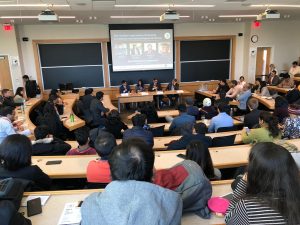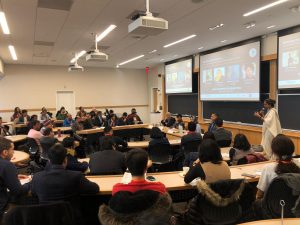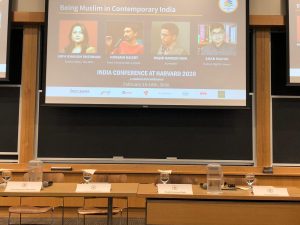Constitutionality of NRC-CAA sparks dialogue at Harvard’s 17th Annual India Conference

Twocircles.net
The 17th Annual Harvard India Conference organized at the Harvard Business School and Harvard Kennedy School on 15th and 16th February bringing together thought leaders from the Indian diaspora for talks relating to India’s path to global leadership.
Aimed at sparking a dialogue across several disciplines, the event was themed as ‘Foresight 20-/20’with valuable discussions, seminars and brainstorms to reflect the well knit community of intellectuals within the Indian diaspora. The two day event with more than a thousand attendees included distinguished artists, academicians, industrialists, athletes, philanthropists, journalists, and government officials.

“There is a deep interest in the NRC-CAA, which is not South Asian, it includes West Africans, Arabs and other ethnicities,” said Biju Mathew representing the New York Taxi Workers Alliance. The prime focus of panel discussions this year being NRC and CAA, Mathew set the agenda for the conference, outlining that the shift to the right is something everyone at a global level has to contend with.
In the last two months massive countrywide protests against the CAA and the news of largest detention centre being constructed in Assam (https://www.aljazeera.com/news/2020/01/human-india-largest-detention-centre-ready-200102044649934.html) has been forcing women and children, in particular, to come out in uproar on the streets. Several international news organizations have been covering these protests at different parts of the country and now the Harvard panel took it up for deliberation in an international forum. A panel discussion focused on the dialectics and constitutionality of the Citizenship measures was organized on Day 1 with eminent speakers - Professor Faizan Mustafa, Aman Waddud and Dr Urmitapa Dutta.

Deeply concerned about the detention camps in the State, Human Rights lawyer in Assam, Aman Waddud highlighted that “there is no investigation whatsoever” before designating a person as a doubtful citizen. He further explained how migration has long plagued the state but the situation has only worsened under the Bharatiya Janata Party’s (BJP) coming to power. Dr Urmitapa Dutta, Associate Professor at University of Massachusetts whose work focuses on everyday violence in the North East stressed that the State is creating a narrative of ‘othering’.
With the release of the final list of National Register of Citizens (NRC) in August 2019 in the State (https://www.indiatoday.in/india/story/assam-final-nrc-list-out-over-19-lakh-people-excluded-1593769-2019-08-31)about19,06,657 people have been rendered stateless. Distinguished constitutional scholar and the Vice Chancellor at NALSAR University of Law, Professor Faizan Mustafa discussed how the present NRC is “a reverse onus of proof upon people to prove their citizenship in the face of any arbitrary questioning of a person as doubtful and unjust.” He further stated that there is a need to look beyond the courts “to forge a notion of citizenship.”

Speaking at the panel discussion on Freedom of Media in Democracy were Jacinta Kerketta, Siddharth Vadarajan, AshwaqMasoodi and Samar Halarnkar. Regular columnist for Scroll.in, Halankar discussed how an initial economic crisis resulted into the present crisis in the Indian journalism, highlighting that the present Media industry in the country suffers greatly in not just terms of government crackdown but in terms of sustainable financial support. He was concerned about how funding for independent media has made journalists disillusioned when faced with debates on reality and idealistic notions of the profession. Vadarajan from the Wire shared similar concerns stating it was really difficult to run a non-profit media house like The Wire itself. He opined that following the traditional business model has led to a decline in information production and editorial value.
Kerketta, on the other hand, stated that it was independent media actually that has the responsibility to counter government’s narratives of marginalization and otherization.
“For Kashmiris, Indian media is not a source for authentic news but only the government’s version of reality in Kashmir,” said Ashwaq Masood, former reporter with Mint. Masoodi is currently a Neiman Fellow at Harvard. She resonated that the media in the Indian democracy was failing in its duty as the fourth pillar and went on to discuss how a lot of what gets reported is all about the powerful, making the lives of the public as ordinary. Echoing the implications of the brutal media crackdown in Kashmir (https://www.theguardian.com/world/2020/jan/05/the-personal-and-economic-cost-of-kashmirs-internet-ban), Masoodi concluded that the Kashmiris are now disillusioned with the Indian media.
